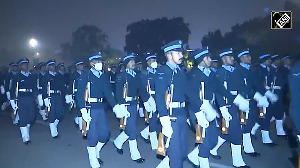Is small beautiful? Are small states better governed? Here we present a debate featuring two veteran political leaders in the wake of the Telangana statehood row.
Mani Shankar Aiyar, former minister for Panchayati Raj.
The question whether smaller states are better governed than bigger ones is irrelevant. In our experience, both large and small states will continue to be badly governed until there is effective devolution of funds, functions and functionaries to local authorities, that is, elected panchayats in villages and urban local bodies in cities.
For governance is not merely a question of how to deal with Pakistan or how to tackle Naxalism. It is more a question of good quality of living, of providing basic services of education, good health facilities, drinking water, employment and other basic requirements. In our race to accelerate growth, we have concentrated entirely on economic reforms to the total neglect of delivery of public good and services to the people at large. There is no public intervention in agriculture, handlooms and other sectors which have a bearing on the lives of a large section of the population.
This is why income inequalities are widening so drastically; why the rich are getting obscenely richer and the ordinary citizens are finding even basic necessities getting further out of their reach. Forbes has just informed us that 0.0000001 per cent of population controls 25 per cent of the GDP of the country. In these circumstances, whether states are bigger or smaller is an issue that does not change anything.
It is only with empowerment of local communities that people will secure their entitlement to basic goods and services. Progress in implementation of grassroot programmes in health and education occurs only in such states where some devolution has taken place. India's middle class has shown that over two generations of access to basic services has enabled it to get empowered. Our goal of inclusive growth will not be realised unless there is good governance, and this is not determined by size.
Whether it is a small state like Sikkim or a big one like Bihar, good governance depends on the extent to which power is devolved. You have seen it in a big state like Madhya Pradesh under Digvijay Singh and a smaller state like Bihar under Nitish Kumar. It has to do with devolution of powers rather than anything else. There are many smaller states but do you see size guaranteeing their development? Again, if a large state has an enlightened leadership that sees merit in devolution of power, things move forward and people are better off with regard to access to basic goods and services.
Karnataka is not a small state, but it's in the forefront when it comes to taking funds, functions and functionaries to the grassroots level. This helps in ensuring transparency and, hence, accountability. This, and not a state's size, is what helps governance.
Kerala is a smaller state but its progress has much to do with the manner in which its governments have been able to distribute funds, functions and functionaries among different levels of government, taking power directly to the masses.
On the other hand, Jharkhand, which was created by dividing Bihar, has not been able to make its mark as a developed state. The reasons are there for all to see. It has not held any panchayat elections since it was formed. Unless power goes to the people instead of remaining concentrated in a single authority, there is no hope for the people in this state.
Of course, many demands for smaller states have to do with ethnic identities and their sense of insecurity. That may or may not be a valid reason for such demands, but as far as governance is concerned, nothing can be a substitute for devolution of power.
I do not want to get into the debate of whether states should be divided for any other reason. I would like to look at the matter only from my agenda taking power to the people.
Ajit Singh, Rashtriya Lok Dal chief
Uttar Pradesh is a classic example of how small states make better sense in a democracy. It is the sixth largest in terms of population in the whole world. Physically, too, it is very big. In a democracy, a dialogue between the ruler and the ruled is absolutely necessary. That is completely out of the question in a state the size of UP. The districts in western Uttar Pradesh, where we are demanding a separate Harit Pradesh, represent a totally different lifestyle, culture and even language as compared to that of, say, Bundelkhand on the other side of the state. That is another aspect of the problem of size.
People of Haryana, which was carved out of Punjab, can go to the capital to air their grievances or get their problems heard in the secretariat and return home by evening, whichever part of the state they are in. But if a citizen in western UP were to be heard in any of the state commissions or courts, he has to travel over 600 km to Lucknow, spending large amounts of money in an attempt to get justice.
People in western UP see for themselves how their neighbours in Haryana and Uttarakhand have prospered after becoming part of smaller states. Their per capita income is much higher compared to the earnings of people in western UP. So they feel a smaller state is essential to have any kind of progress.
On the other hand, there are problem states like Jharkhand. Was Jharkhand any better off when it was part of Bihar? Naxalites had always been there. There are, however, other states like Haryana and Andhra Pradesh that have set good examples. The latter was part of Madras Presidency till it was carved out.
Again, Gujarat is better off after being cut from the larger Bombay Presidency. Punjab was split into three -- Himachal Pradesh, Haryana and Punjab and all of these are better off. Before the division, Haryana was the poorer part of Punjab. Men from Western UP never married the women there as they were known to walk 10 km to fetch water. Today, such a situation cannot be imagined in Haryana.
Cultural identity is another reason why people demand separate states. But the underlying factor is a sense of alienation the people feel from the power centre. If Harit Pradesh is created by incorporating administrative divisions like Meerut, Bareilly, Mathura and Agra, it would be as big as Rajasthan. So it won't necessarily be a small state. At present, UP has 80 parliamentary seats, and if it is divided by three excluding the five seats for Bundelkhand, it still makes for three big states. Gujarat, for instance, has 25 seats.
Of course, one doesn't rule out demands for further divisions in western UP (demand for Brij Bhumi, a small stretch running from Mathura to Mainpuri) but that is a cultural issue rather than one of governance.
The problem is that the Centre does not have pre-determined norms for dealing with such demands, but it acts only when people get violent. This sends a wrong message. As a result, people start burning buses at the slightest provocation as they feel that is the only way to draw Centre's attention.
Did Delhi notice what was wrong with sugarcane farmers till they came and surrounded the capital? Despite the Congress and K Chandrasekhar Rao having made a pact in 2000 to form Telangana, the Centre waited for Rao to go on a fast unto death to react.
Today, the district of Coorg is also demanding statehood as it has a totally different cultural identity. Maybe the solution is not statehood here. But there are states whose chief ministers would not be able to remember the names of the districts or their district magistrates. This certainly is a sign that such states is ungovernable.










 © 2025 Rediff.com -
© 2025 Rediff.com -